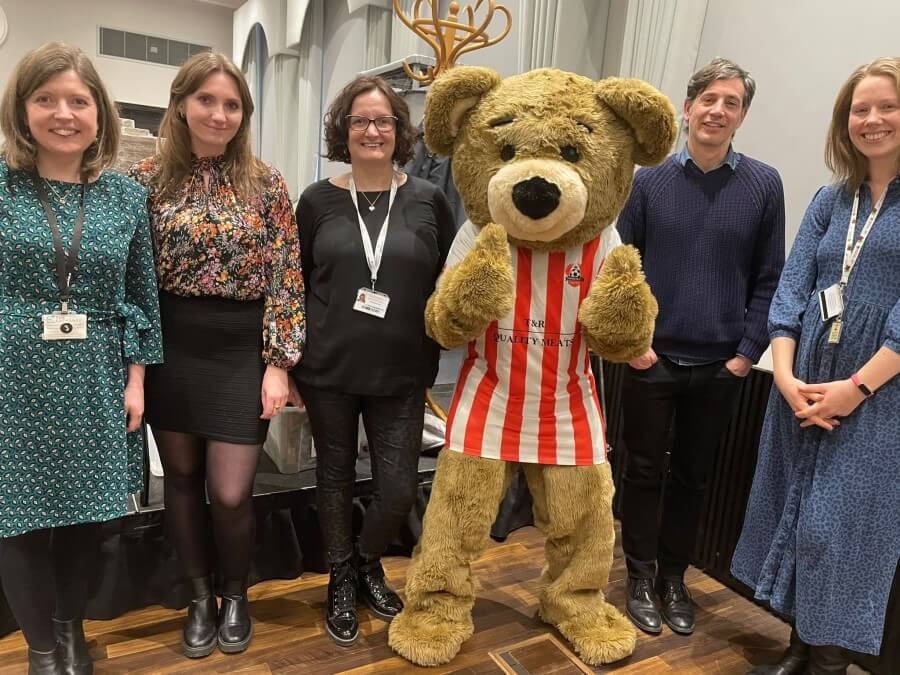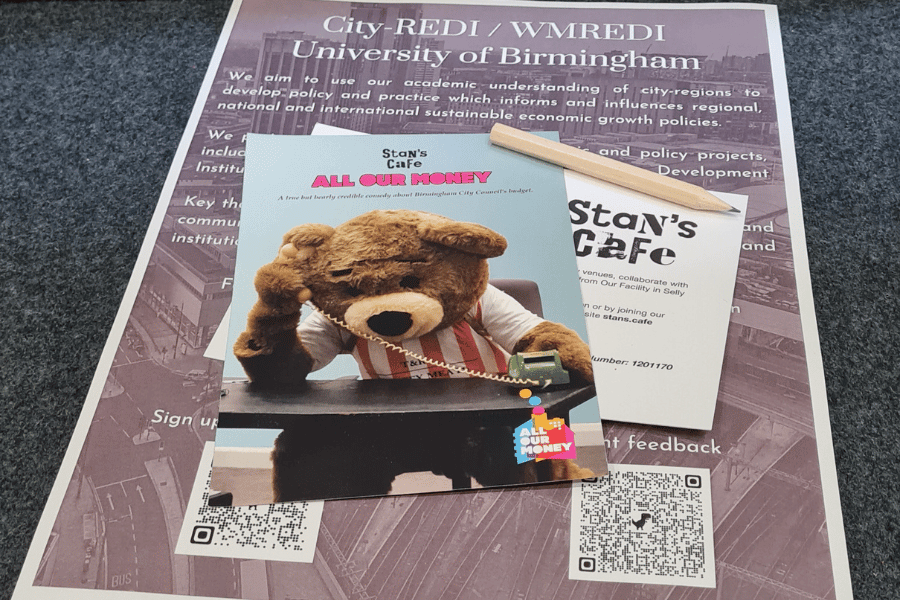On 15th March, Stan's Cafe put on a sold-out performance about how Birmingham City Council spends £3,000,000,000 of our money. The event was held at The Exchange, University of Birmingham. Here's what we learned from the play.
Annoyed about your bins not being picked up again, or the ridiculous number of bollards that just popped up on your pathway? Who do you blame? Birmingham City Council! A new play by Stan’s Cafe will make you question all your assumptions about the failures of local government in the UK, as they take on the impossible job of running services they must provide on shrinking budgets and the tight leash of central government funding.
All Our Money
Stan’s Cafe, with research input from City-REDI, University of Birmingham, have been touring All Our Money in venues all over Birmingham, and on Wednesday 15th March, put on two sold-out showings at The Exchange, University of Birmingham.
Stan’s Cafe is a group of artists from a variety of disciplines, but mostly theatre makers, working under the artistic direction of James Yarker. The company consists of an evolving team of long-term collaborators and associated artists, the line-up changes according to the project being worked upon.
The play featured Aaron Corbett as Bordesley, the newly elected Mayor of Birmingham City Council, a mascot for Bordesley FC, who spends most of the play in a bear suit. It sounds outlandish that a monkey mascot could be elected to the head of a council. But in 2002, H’Angus the Monkey was elected the mayor of Hartlepool Council on a mandate of “free bananas for school children”. H’Angus the monkey, better known as Stuart Drummond, went on to be elected a further two times before emigrating to Australia.
Bordesley is ably assisted by Craig Stephens, Chief of Staff, who makes sure Bordesley fulfils all his statutory obligations and has no money to spend on any new initiatives (think Nigel Hawthorne in Yes Minister), and Shireenah Ingram, who plays a multitude of characters representing the many heads of the services that Birmingham City Council provides and demonstrating an excellent range of local accents. The play is produced by Dominic Thompson assisted by Nick Sweeting.
Insight into the workings of local government
The play was funny and engaging and gave a fantastic insight into the workings of local government. Local councils have a lot of services to deliver and very little control over how they spend the money they receive from central government. Statutory requirements to deliver local services like schools, children’s services, adult social care and rubbish collection to name just a few, don’t leave a lot of money left over for new initiatives. It gave the sense of a council being a middleman, trapped by whatever funding central government decides to give them, and moving the money straight on to the heads of each department to maintain their commitments.

Councils have three main sources of funding, council tax, business rates and government grants. As our research to support the development of the play has emphasised, each source of funding has limitations. Council tax rates are based on valuations from 1991 and councils are unable to raise rates by more than 2% a year (the inflation rate at the time of writing is 9.2%) without a local vote. Business rates are set by central government and revenues have fallen over time as high streets have been hollowed out by the pandemic, inflation and the move to online shopping.
Government grants over recent years have often been top-down, competitive-based funds and our research has emphasised tensions between central government priorities and the needs and requirements of local government. As we highlight in previous work on levelling up, government grants can stifle partnership working, encouraging piecemeal bidding and lack of long-term investment. Small competitive pots are also no replacement for long-term investment in place to address structural inequalities and the general reduction in local budgets.
Councils can sell services they run, but the monies raised are usually ringfenced in some way. For example, the funds raised by council-owned properties must be spent on the building, maintenance, and upgrade of properties. Money raised by the Ultra-Low Emissions Zone (ULEZ) must be spent on green projects and central government also takes a cut for the administration of the programme.

On top of this, is the complexity of local government in England. Transport in the region, for example, is under the control of the West Midlands Combined Authority led by Mayor Andy Street. To meet Birmingham’s local transport needs, it may be competing (or working in partnership) with 16 other councils and their needs.
By the end of “All Our Money” your sense of what local councils do or don’t do, is turned totally on its head. A big thanks to Stan’s Cafe for putting on this fantastic play and bringing our research to life.
Read our report about the finances of Birmingham City Council.
Find out more about the play and Stan’s Cafe
Disclaimer:
The views expressed in this analysis post are those of the authors and not necessarily those of City-REDI / WMREDI or the University of Birmingham.


